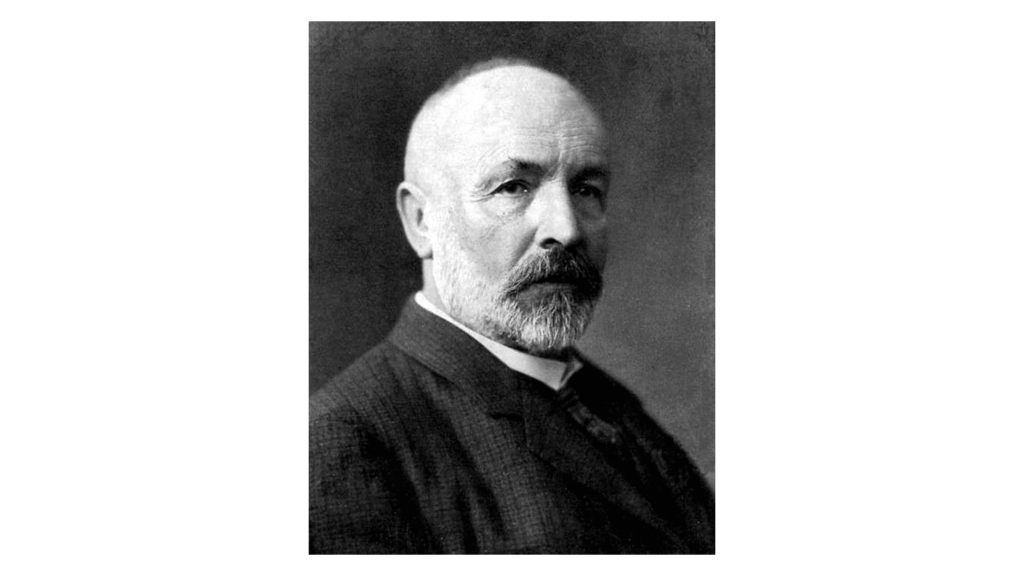Georg Cantor
Georg Cantor (1845-1918), the Father of Infinity, was a famous German mathematician who introduced the concept of infinite numbers. His revolutionary work on infinity reshaped mathematics at the time, despite facing significant opposition during his lifetime. Today, his contributions are celebrated as some of the greatest in the history of mathematics.
His story is one of brilliance, resilience and the relentless pursuit of truth, no matter the infinite amount of obstacles.

Early life
Georg Cantor was born on March 3, 1845, in Saint Petersburg, Russia to a culturally rich family. His father was a thriving merchant while his mother was very musical. It is said he inherited her musical talents, leading to Cantor becoming an outstanding violinist. In 1856, the family moved to Germany due to his father’s ill health. He attended private schools where his mathematical talent shone, especially in trigonometry. His teachers recognized his brilliance and prompted him to take his knowledge of mathematics to the next level. However, there was one obstacle in the way. His father wanted him to become an engineer. But young Georg had other plans. After much persuasion, he convinced his father to let him follow his passion for mathematics. If Cantor became an engineer fixing horse carts, would there be such a thing as infinite numbers?
He began his higher education in Zurich in 1862, but transferred to the University of Berlin in 1863 after his father’s death. There he studied maths under prominent figures such as Leopold Kronecker. He earned his doctorate in mathematics in 1867 with a dissertation on number theory.
Early career
Cantor’s early academic career was somewhat unremarkable compared to the rest of his life. In 1869, he joined the University of Halle as an unpaid lecturer. Two years later, he married Vally Guttmann, whom he had 6 children with. Forget infinity, even 6 was surely too many to handle!
Wrestling with infinity
Georg’s ground-breaking work began in 1873 when he tackled one of the most fundamental questions in maths: what does it mean for something to be infinite? Up until then, infinity was treated as more of an abstract concept than a mathematical one, in that nothing about it could be studied or rationalized.
One of Cantor’s first major breakthroughs came when he proved fractions are ‘countable’, meaning they can be put into a one-to-one correspondence with natural numbers (1, 2, 3,… ). This result was surprising but intuitive enough for most mathematicians to accept.
However, what came next shook the foundations of mathematics. Cantor showed that real numbers, including irrational numbers like Pi, are uncountable. He used an ingenious method called the diagonal argument, which demonstrates that no matter how you try to list all the real numbers between 0 and 1, there will always be numbers left out. This discovery led to Cantor to develop his theory of transfinite numbers, which essentially involves different ‘sets’ of infinity, where some sets are larger than others despite them all being ‘infinity’.
A lonely genius
While Georg saw beauty and truth in his discoveries about infinity, many of his peers were less enthusiastic. His former mentor Leopold Kronecker became one of his harshest critics. Many mathematicians aside from Kronecker also viewed his work as too radical for its time. The hostility took a toll on Cantor’s mental health. He suffered from severe depression throughout much of his life.
Despite these challenges, Cantor continued to publish ground-breaking papers on his theories.
Later years
By the late 1880s, Cantor shifted his focus to philosophy and theology, seeing connections with his work on infinity with theories about God and existence. He even came up with a theory that Francis Bacon was the true author behind Shakespeare’s plays!
In 1884, Cantor experienced his first major depressive episode. Despite this setback, he continued to teach at Halle until 1913 when he retired due to poor health. Recognition for his work came late but, not too late. In 1904, he was awarded the prestigious Sylvester Medal by the Royal Society for his achievements in mathematics.
However, World War One brought new problems for Georg and his family. Food shortages caused his health to deteriorate, forcing him to spend his final years in sanatoriums where he continued to publish papers. In January of 1918, Georg Cantor passed away from a heart attack in Halle at the age of 72.
Legacy
Today, Georg Cantor is celebrated as one of history’s greatest mathematicians who dared to explore concepts others feared or deemed impossible. His work laid the foundation for fields ranging from logic to computer science to philosophy. Though he faced immense challenges during his lifetime, both personal and professional, Cantor’s legacy still stands as a testament to human curiosity and perseverance. He didn’t just study infinity. He embraced it, and in doing so, changed our understanding of mathematics forever.